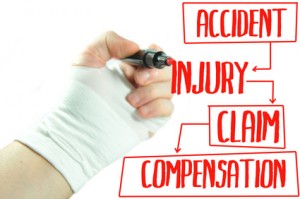Sometimes there is confusion about what actually qualifies as “personal injury law.” As the name implies, this area of the law deals with cases where an individual or individuals have been injured. In order for an injury claim to fall under the umbrella of personal injury law, however, the claimant must have been injured as a result of the negligence or wrongdoing of another person. An individual who is injured simply “by accident” when they are alone or who is injured due to their own negligence or careless behavior does not have a personal injury case. 
The majority of personal injury cases result from road accidents—accidents involving automobiles, bikes, and motorcycles. Individuals who drive or bike on the road legally agree to exercise caution and to operate their vehicle responsibly. Drivers or bikers who fail to exercise reasonable care and who injure another person(s) as a result of that negligence can be held responsible in personal injury cases. Although there is no way to travel back in time and undo an injury or an accident, personal injury lawyers seek to help their clients win settlements. In addition to what your auto insurance/the auto insurance of the at-fault individual will cover, this financial compensation is meant to help you with the cost of the medical bills and lost wages that may come as a result of your injury. Because injuries cannot be magically healed and painful memories cannot be automatically erased, a monetary settlement is the fairest way the government chooses to compensate victims for their losses.
It is important to note that damages incurred as a result of personal injury accidents are not always physical. The damages or harm a person receives may be physical, mental, or both. Mental damages can include suffering in the form of distress, anxiety, humiliation, depression, grief, etc. Because these types of conditions can have many symptoms and manifest themselves differently in each person, they are more difficult to prove in legal situations. These damages are considered “non-economic damages,” which means that they are not direct, out-of-pocket losses. It is difficult to assign a dollar amount to depression or to grief, and so the acceptance of mental damages in personal injury cases varies from case to case. Typically, the injured individual must be able to show that they suffer emotionally by a preponderance of the evidence, or “more likely than not.”
Although negligence is the standard by which personal injury cases are evaluated, the American Bar Association describes two additional bases for personal injury:
- Strict liability: This area of the law holds designers and manufacturers liable for injuries that may occur as a result of defective products. The injured person does not need to prove negligence of the manufacturer. Instead, they must prove that the product was designed or manufactured in a manner that made it unreasonably dangerous when used as intended.
- Intentional wrongs: Intentional wrongs occur when you are physically or emotionally injured by a person who knew they could intentionally be causing you harm. Examples of intentional wrongs include someone hitting your car as a practical joke, tripping you on purpose, etc. The American Bar Association also discusses store detectives wrongly detaining you as an example of false imprisonment, and, therefore, personal injury. Such imprisonment could result in humiliation and other forms of mental anguish, which would give you a solid personal injury claim.
If you are able to prove that the defendant in a case is the person liable for your injuries, you will then move on to dealing with the insurance company. Assuming the defendant possesses proper accident insurance. their insurance company will compensate you for your medical expenses and wages you lost. The more difficult part of the process, however, is proving “pain and suffering.”
According to AllLaw.com, “pain and suffering” refers to “a host of injuries that a plaintiff may suffer as a result of an accident. It encompasses not just physical pain, but also emotional and mental injuries such as fear, insomnia, grief, worry, inconvenience, and even the loss of the enjoyment of life. In almost every injury case, the plaintiff should be able to recover some amount, even if rather small—and sometimes very large—for pain and suffering damages.
Although insurance companies are under no obligation to use the methods, attorneys often attempt to show “pain and suffering” by using two calculation methods. These methods suggest a dollar amount that should be awarded to injury victims:
- The Multiplier Method: Attorneys will multiply the plaintiff’s damages of medical bills and lost wages by a number generally between 1 and 5. This number depends on the severity of the injuries, and is different for each case. The new total amount is meant to represent an appropriate amount to be awarded for “pain and suffering.”
- The Per Diem Method: Per Diem is Latin for “per day.” This method allows attorneys to assign a daily amount of money to each day from the day of the accident until the day the plaintiff is fully recovered. This daily amount is also meant to represent a reasonable sum of money to compensate for “pain and suffering.”
Personal injury cases can get complicated, and it is often difficult to navigate through the claims process without an attorney. At Good Guys Injury Law, we do everything we can to help you receive the benefits you deserve. If you or a loved one has been injured due to the negligence of another, give us a call today at (801) 506-0800 to schedule a free consultation.
Photo copyright to Injury Lawyers San Luis Obispo